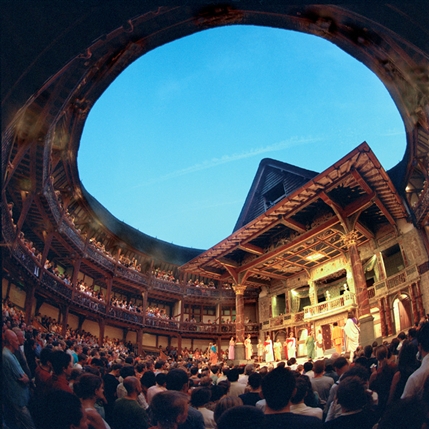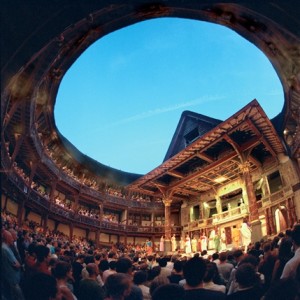
303.7K
Downloads
447
Episodes
New for 2023: Victorian Poetry Scroll back for previous courses on Shakespeare, Eighteenth Century Poetry, Close Reading, Various film genres, Film and Philosophy, the Western Canon, Early Romantics, 17th Century Poetry, etc.
Episodes

Wednesday Apr 14, 2010
Antony and Cleopatra, part 2 of 4
Wednesday Apr 14, 2010
Wednesday Apr 14, 2010
Antony and Cleopatra a new departure: not about public vs private but about two modes of publicity: present and future. O'erflowing the measure, again. Enobarbus as a new experiment in the series of window characters starting with Aumerle and including Horatio, Kent, the Fool, Edgar, and Banquo. Hamlet loves Horatio who is dispassionate in judgment; Kent is like Horatio but Edgar and the Fool go much farther in focusing on the window; Macbeth kills Banquo; Enobarbus betrays Antony.

Friday Apr 09, 2010
Antony and Cleopatra Part 1
Friday Apr 09, 2010
Friday Apr 09, 2010
Introduction to Antony and Cleopatra as a new kind of tragedy: one which doesn't seek the freedom of complete loss or amor fati. Contrasted with Macbeth, written simultaneously. Macbeth is about the maximum of loneliness in a tragic figure; Antony and Cleopatra is about what having a friend till the end offers by way of a relationship to time and loss. Lady Macbeth compared to Lear. Antony and Cleopatra compared to A Midsummer Night's Dream.

Friday Apr 02, 2010
Friday Apr 02, 2010
Talk on the anonymity of the narrator and narratee in Proust, and their relation to the losses that occur in the book but not in the narrative. Illustration of idea that Proust presents the converse of Cavell: uncountable external worlds but only one other mind. How narrator turns into his mother watching his mother turn into his grandmother. Roger Caillois and vision as mimesis. Discussion session (poorer audio) for all the papers.

Friday Apr 02, 2010
Second Talk: Nicolas de Warren on Aspects of the Imagination in Proust
Friday Apr 02, 2010
Friday Apr 02, 2010
Nicolas de Warren's talk on "Aspects of the Imagination in Proust," in the way faces are perceived and make one feel perceived; the recognition of the other; and their relation to love and to death.

Friday Apr 02, 2010
First Talk: Dick Moran on The Proustian Involuntary
Friday Apr 02, 2010
Friday Apr 02, 2010
Richard Moran's talk on four kinds of relationships between the voluntary and the involuntary in Proust, and their relation to eros and to aesthetic response.

Friday Apr 02, 2010
April Vacation Bonus: Proust and Philosophy, Introduction
Friday Apr 02, 2010
Friday Apr 02, 2010
April Vacation Bonus: Proust and Philosophy Conference at Wellesley College. Part 1: Short Intro (audio sketchy). Laura Quinney convenes seminar and everyone introduces her- or himself.

Saturday Mar 27, 2010
Macbeth concluded; 2-week vacation hiatus
Saturday Mar 27, 2010
Saturday Mar 27, 2010
Second and concluding lecture on Macbeth before two-week break: the solitude of the present moment; the only relief to that is friendship; Banquo as window, like Bullingbrook, Horatio, Kent, the Fool, and Edgar; but Macbeth murders Banquo and must not look to have friends (Seyton is his last forlorn hope), and so is lost in time, like tears in rain, time's bank and shoal eroded into dust and ashes.

Saturday Mar 27, 2010
Macbeth concluded; 2-week vacation hiatus
Saturday Mar 27, 2010
Saturday Mar 27, 2010
Second and concluding lecture on Macbeth before two-week break: the solitude of the present moment; the only relief to that is friendship; Banquo as window, like Bullingbrook, Horatio, Kent, the Fool, and Edgar; but Macbeth murders Banquo and must not look to have friends (Seyton is his last forlorn hope), and so is lost in time, like tears in rain, time's bank and shoal eroded into dust and ashes.

Tuesday Mar 23, 2010
Macbeth Part One
Tuesday Mar 23, 2010
Tuesday Mar 23, 2010
Somewhat fumbling and disappointingly inarticulate account of time and the specious present in Shakespeare, and its most intense presentation in Macbeth. The difference between the character (with his history and prospects) and the subject, existing in the present only which is all that exists, and experiencing his history and prospects as outside of himself. Tragedy, time, and pure subjectivity.

Wednesday Mar 17, 2010
King Lear Part 3 - Conclusion
Wednesday Mar 17, 2010
Wednesday Mar 17, 2010
Edgar. His relation to Gloucester, and to Edmund. The kindness of the gods. Jacob and Esau reunited. Exchanging charity. Love between mortals.

Friday Mar 12, 2010
King Lear, second lecture
Friday Mar 12, 2010
Friday Mar 12, 2010
Embarrassing parents and what they know; what does Edmund want?; sibling competition and bonding; the fool and Cordelia

Thursday Mar 11, 2010
King Lear: Part 1
Thursday Mar 11, 2010
Thursday Mar 11, 2010
The oddness of writing a tragedy about a person whose life is already just about over; some flushing of the coverts of the microglot in order to consider the modes and methods of Shakespeare's delicate suggestiveness; the opening lines of the play; Edmund's embarrassing and embarrassed situation.

Tuesday Mar 02, 2010
Hamlet, part 3: conclusion
Tuesday Mar 02, 2010
Tuesday Mar 02, 2010
More on Hamlet's relation to representations of revenge; their relevance; the difficulty of distinguishing between crime and punishment; the failure of moral luck to provide a distinction; Hamlet compared to <>Vertigo; Horatio's dispassionate judgment; how Hamlet defeats Claudius as a matter of drama and theatrical dynamic and not the establishment of facts antecedent to the start of the play.

Saturday Feb 27, 2010
Hamlet part 2: Hamlet, Laertes, Introspection, and Drama
Saturday Feb 27, 2010
Saturday Feb 27, 2010
A continuation of the analysis of Hamlet, both character and play. What is the nature of Hamlet's interiority? What relation does it have to his being a character in a drama? How does he parallel, and how diverge, from Laertes? The possibility that Claudius is Hamlet's father is treated, with respect to what this would mean from the point of view of the ghost. The disappearance of the ghost in Act V is noted and considered. Preferences among preferences or second order desires are introduced.

Wednesday Feb 24, 2010
Hamlet, Lecture 1
Wednesday Feb 24, 2010
Wednesday Feb 24, 2010
Introduction to Hamlet; idea of revenge in law and in tragedy (revenge as representation of crime); characters of Horatio, Claudius, and Hamlet

Sunday Feb 14, 2010
Feb vacation bonus: How to Fix Literary Darwinism
Sunday Feb 14, 2010
Sunday Feb 14, 2010
Classes start up again February 22. In the meantime, here's a talk I gave at Wayne State on February 12, on biological game theory and narrative, with almost no Shakespeare in it, but lots of Golden Balls: I think it's pretty followable as a podcast, but you won't get the visuals of the YouTubes I show at the end. Comment if you want links to the videos.

Wednesday Feb 10, 2010
Merchant of Venice
Wednesday Feb 10, 2010
Wednesday Feb 10, 2010
A compressed and rapid survey of some of the major issues in The Merchant of Venice

Saturday Feb 06, 2010
Midsummer Night's Dream, concluded
Saturday Feb 06, 2010
Saturday Feb 06, 2010
We complete our analysis of the story arc of Midsummer Night's Dream, an arc formed out of a mosaic of characters, consider especially the relationship between our interest in the erotic life of others, and the experience of theater. We end by discussing the melancholy elements of the play which give its moments of happiness both depth and value.

Tuesday Feb 02, 2010
Richard II conclusion & Midsummer Night's Dream Intro
Tuesday Feb 02, 2010
Tuesday Feb 02, 2010
We conclude our discussion of Richard II and segue elegantly into a discussion of A Midsummer Night's Dream

Friday Jan 29, 2010
Richard II, part 3
Friday Jan 29, 2010
Friday Jan 29, 2010
Discussion of Richard's last soliloquy, and other laments about nothingness, and subjectivity.

Wednesday Jan 27, 2010
Second lecture on Richard II
Wednesday Jan 27, 2010
Wednesday Jan 27, 2010
We continue our consideration of Richard II, and the deep and complex chess game, played both in private and in public, between Richard and Bullingbrook, with Mowbray and Gaunt as their pawns.

Saturday Jan 23, 2010
First lecture on Richard II
Saturday Jan 23, 2010
Saturday Jan 23, 2010
We begin considering Richard II and Shakespeare's work generally via Sonnet 73 ("That time of year"), which introduces us to Shakespeare's thinking about time.
